background
Whether bananas, cocoa, cookies or spices – per capita spending on Fairtrade products in Germany has risen to over 30 euros. But does the seal really guarantee consumption with a clear conscience?
The range of fair food with raw materials from southern countries has expanded enormously in recent years. In addition to the most commonly sold fair food products, coffee, cocoa and bananas, there are now also biscuits, spices, dried fruits and wine, for example. Food makes up 75 percent of fair trade. The rest of the quarter includes textiles, flowers, handicrafts and footballs, among other things.
Fairtrade promises stable minimum prices and premiums, better working and living conditions and the most environmentally friendly cultivation possible, which is what fair trade products should stand for. However, the term “fair” or “fair trade” is not legally protected. There is no uniform seal, but rather many “Fair” labels. According to consumer advice centers, the “Fairtrade” label is one of the trustworthy seals. It adheres to internationally agreed trading principles.
Sales increased, sales decreased
A total of 8,500 products with the seal can now be purchased. “It is very important for people that they have the feeling that they are initiating change with their purchase,” says Claudia Brück, head of communications and politics at Fairtrade Germany. Sales of Fairtrade products in Germany rose by 8.5 percent to 2.6 billion euros in 2023.
“Consumers remain loyal to Fairtrade even in times of inflation and financial uncertainty,” concludes Detlev Grimmelt from Fairtrade Germany at the association’s annual press conference. However, sales of Fairtrade products, i.e. the quantity of products sold, also fell slightly.
Despite Fairtrade, below the poverty line
But how good can consumer conscience really be when purchasing such products? Some experts believe that Fairtrade’s conditions are not sufficient. This includes Friedel Hütz-Adams, research assistant at Südwind eV, the Institute for Economics and Ecumenism. Among other things, he deals with poverty and grievances in the global south as well as the behavior of consumers in Germany.
“The companies that use the label pay the minimum prices set by Fairtrade to the farmers, but do not guarantee them a living income,” says Hütz-Adams. Almost half of the cocoa farmers live below the absolute poverty line.
“The goal must of course be for people to be able to live from the work of their hands,” says Claudia Brück from Fairtrade. However, Fairtrade is about looking at how much work goes into a kilo of coffee and how high the costs are – that then results in the Fairtrade price.
This price should be seen as a safety net and should cover the average production costs for sustainable production. It could be that the individual farmer has to feed too many people or has too little land. The minimum price cannot therefore always guarantee a living income.
Can small companies afford certification?
Anyone who wants to sell their products under the Fairtrade seal must be certified. There is always criticism that smaller producers in particular cannot afford it. Although these in particular met ecological criteria from the outset, for example by not using chemical fertilizers.
Claudia Brück from Fairtrade rejects this. “In addition to the minimum price, we also pay premiums. The certification costs make up less than three percent of the premiums. That’s definitely feasible.” Premium income from sales on the German market was 42 million euros in 2023.
Fairtrade premiums are always paid additionally. The idea is that farming families or employees on plantations decide together in which social, ecological or economic projects the bonus will be invested and which goals should be achieved.
17 percent market share for cocoa
Regardless of the certification, “the bonus is an important investment tool for local people, especially now that they have to deal with price increases and higher costs of living,” says Brück. World market prices, especially for cocoa and coffee, are currently rising sharply, partly due to climate-related declines in harvests. That is very worrying. Therefore, more money must flow to the south, there must be more direct partnerships and long-term investments.
According to Brück, the first figures for 2024 show that Fairtrade sales are increasing again. However, the market share can still be expanded. The main product, cocoa, has a 17 percent market share. But for the next most popular coffee only five percent, for the third most popular, bananas, around 16 percent.

